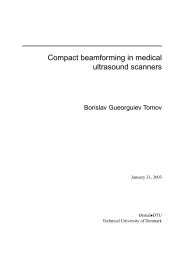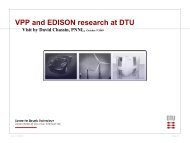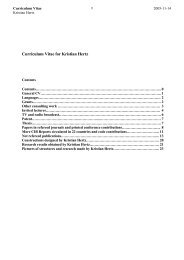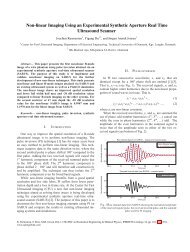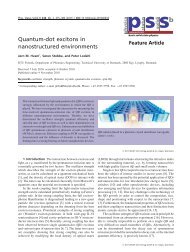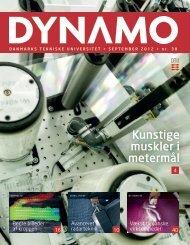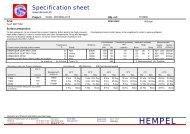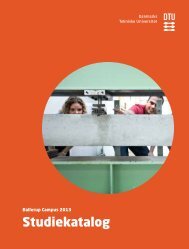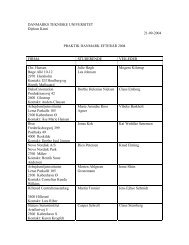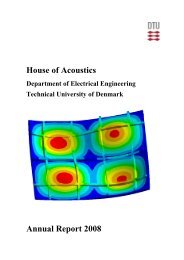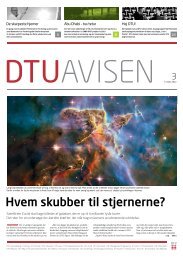Role of Intestinal Microbiota in Ulcerative Colitis
Role of Intestinal Microbiota in Ulcerative Colitis
Role of Intestinal Microbiota in Ulcerative Colitis
You also want an ePaper? Increase the reach of your titles
YUMPU automatically turns print PDFs into web optimized ePapers that Google loves.
Discussion and conclusion<br />
160<br />
7. Discussion and perspectives<br />
communications (Takaishi et al., 2008;Sokol et al., 2009), and could <strong>in</strong>dicate that the commensal<br />
microbiota <strong>in</strong> remission is unstable and unfavorable events could contribute to microbial<br />
compositional changes provok<strong>in</strong>g flare‐ups. However, further longitud<strong>in</strong>al studies are needed to<br />
obta<strong>in</strong> sufficient <strong>in</strong>formation both microbiological and immunological on this area, hence help<strong>in</strong>g<br />
elucidate if the microbial compositional changes are causal to or consequence <strong>of</strong> disease.<br />
The ability <strong>of</strong> the fecal microbiota derived from UC patients <strong>in</strong> either remission or relapse and<br />
healthy subjects to colonize an artificial mucus layer was exam<strong>in</strong>ed <strong>in</strong> Paper 2. The results from<br />
this study demonstrated that the mucosal microbial community differs from that <strong>of</strong> the lumen,<br />
whether the microbiota was derived from healthy subjects, UC patients <strong>in</strong> remission or relapse.<br />
These f<strong>in</strong>d<strong>in</strong>gs are <strong>in</strong> agreement with previous <strong>in</strong> vivo (Zoetendal et al., 2002;Macfarlane, 2008)<br />
and <strong>in</strong> vitro studies (Macfarlane et al., 2005;Van den Abbeele et al., 2011a). Additionally, the<br />
results from Paper 2 revealed that bifidobacteria and lactobacilli from UC patients <strong>in</strong> relapse were<br />
found <strong>in</strong> significantly lower levels <strong>in</strong> mucus than when derived from healthy subjects. However,<br />
the question is, whether the low levels <strong>of</strong> adhered lactic acid bacteria from UC patients <strong>in</strong> relapse<br />
are a result <strong>of</strong> low basel<strong>in</strong>e levels <strong>in</strong> feces or decreased capacity <strong>of</strong> the bacteria to adhere? Based<br />
on results from Paper 1 (us<strong>in</strong>g some <strong>of</strong> the same <strong>in</strong>dividuals as <strong>in</strong> Paper 2), it was demonstrated<br />
that the level <strong>of</strong> fecal Lactobacillus spp. was significantly lower <strong>in</strong> UC patients <strong>in</strong> relapse than <strong>in</strong><br />
healthy subjects. However, no significant difference was observed for the fecal levels <strong>of</strong><br />
Bifidobacterium spp.. This could imply that lactic acid bacteria derived from UC patients <strong>in</strong> relapse<br />
have decreased capacity to colonize the mucus <strong>in</strong>dependent <strong>of</strong> basel<strong>in</strong>e levels <strong>in</strong> feces. The<br />
decreased capacity <strong>of</strong> bifidobacteria and lactobacilli to colonize the mucus could be due to<br />
changed expression <strong>of</strong> adhesion molecules. Adhesion‐promot<strong>in</strong>g molecules have been observed <strong>in</strong><br />
species <strong>of</strong> Lactobacillus and Bifidobacterium <strong>in</strong>clud<strong>in</strong>g fimbriae (Pridmore et al., 2004;Kanka<strong>in</strong>en<br />
et al., 2009;Gilad et al., 2011), Msa, mannose‐specific adhes<strong>in</strong> prote<strong>in</strong> (Pretzer et al., 2005),<br />
MucBP doma<strong>in</strong> conta<strong>in</strong><strong>in</strong>g prote<strong>in</strong>s (Kleerebezem et al., 2010), and elongation factor (EF‐Tu)<br />
(Granato et al., 2004;Gilad et al., 2011). However, proteomic analyses <strong>of</strong> bifidobacteria or<br />
lactobacilli isolated from UC patients have to my knowledge not previously been conducted to<br />
reveal, if changes <strong>in</strong> bacterial phenotypes occur dur<strong>in</strong>g mucosal <strong>in</strong>flammation.<br />
The decreased capacity to colonize mucus could also be due to <strong>in</strong>tra‐species variations with<strong>in</strong> the<br />
lactic acid bacteria genera. In Paper 1 and 2, different species <strong>of</strong> Bifidobacterium were quantified



